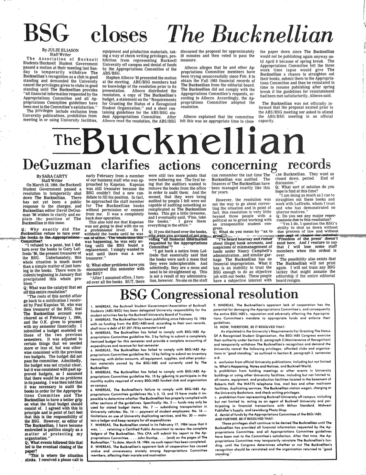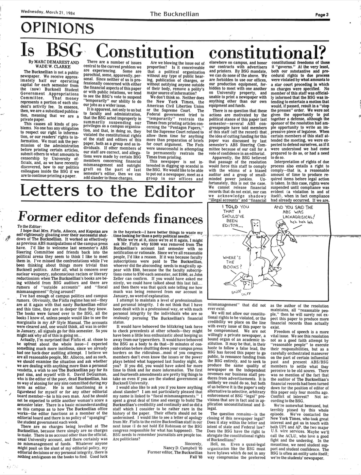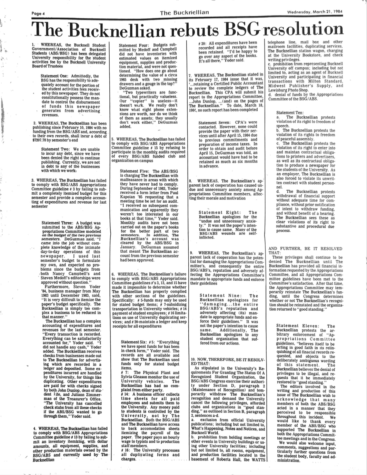From the Archives: The Bucknellian-BSG War of 1984
February 24, 2023
Images courtesy of David DeGuzman ‘86.
While many people see The Bucknellian as the keystone of the student voice on campus, there are many things that people may not know about the paper.
The Bucknellian was stripped of its club membership and barred from publication by Bucknell Student Government for one month in 1984 — verified through past Bucknellian issues located in Bertrand Library and from interviews with former Bucknell Student President Ed Robinson ’86 and former Bucknellian Editor-in-Chief David DeGuzman ’86, who led their respective factions during the struggle.
Background
To begin to understand what happened between The Bucknellian and the Bucknell Student Government of the time, there needs to be a groundwork in place for how different everything was 40 years ago. Compared to the strict security systems in place today, students on campus from 1983–1984 had less oversight and more freedom. However, this lack of oversight did not apply to all organizations.
Alcoholism was a main concern of campus administrators and it appeared regularly in The Bucknellian. Smoking and drinking were common for students, the latter of which being more visible in students’ lives. On Fridays and Saturdays, Fraternities would have parties in their houses where anyone was invited, which led to the now-traditionalized “Super Saturdays.”
The Bucknellian was “literally autonomous,” DeGuzman said.
The paper paid The Daily Item to send them galleys of their finished product, and from there the editors stayed up all night Thursday to literally print the paper from wax machines and finish boards in the basement of Roberts Hall, he said. It was an intense and arduous process. Just as it is today, the team at The Bucknellian had no oversight from Bucknell outside of an advisor.
“It was up to you,” DeGuzman said. “You signed the checkbook and did what you needed to do.”
While now there are many ways for students to get their news, 40 years ago, The Bucknellian was one of the only ways to see what was happening on campus. Therefore, there was more of a reliance on The Bucknellian in general from the student body back then.
They posted events for the following week, classifieds, coupons for stores downtown, much like the Bucknell Message Center provides for students now.
The readership shown here did not just extend to students. Rather, downtown Lewisburg read the paper heavily too, so when The Bucknellian published a restaurant review, which they did on occasion, there was a possibility the local businesses would have a reply on-hand.
Something else to keep in mind is that the Association of Bucknell Students (ABS), the former name of the Bucknell Student Government (BSG), also had much more power than the relatively ceremonial powers which BSG has today.
“The BSG ran the government of the school,” Robinson said. “We talked to the deans. People I didn’t even know stopped me to offer unsolicited advice.”
Shutting Down
Tensions between the ABS and The Bucknellian occurred far before DeGuzman and Robinson took office in their respective roles. This was part of the reason why in the Nov. 18, 1983 edition of The Bucknellian, DeGuzman’s predecessor to the Editor-in-Chief position, Nancy Campbell ’85 wrote an editorial reading, “We strongly support the candidate Ed Robinson ‘86…Robinson has the foresight to make the ABS an effective decision making institution and the perception to understand that the ABS is not that institution now.”
This statement from her is important because throughout her tenure, she had routinely criticized ABS, as stated in an editorial marked Sept. 30, because it “has failed to abide by the rules governing their conduct and accountability to the student body.”
There was also a large controversy the semester before, fall of 1983, when it was revealed in an editorial by Campbell that “Over the summer, the steering committee intervened when the concert committee was trying to sign up a band for this semester. Why? Because the steering committee didn’t like the convert committee’s choice in music.”
This choice was revealed to be the band U2, which was something spoken about by both Robinson and DeGuzman as an incredible controversy and an example of the inefficiency of the ABS.
In a time when The Bucknellian had little-to-no oversight, and the ABS was constantly derided and mocked as inefficient, how else might the new and improved ABS kill two birds with one stone in the new year? By silencing a wide critic you can’t control, The Bucknellian, and by doing it efficiently. “It was Al Capone and taxes,” Robinson said.
In the Feb. 17 issue of the Bucknellian, it was revealed that the ABS sent members of the Appropriations Committee to audit the Bucknellian for fears that they were maintaining an unregistered bank account. In the same issue, there was news that a motion to change the name from ABS to BSG was defeated.
In reality, DeGuzman, who had taken up the job after a brief crisis where an editor in chief was sorely needed, admitted ignorance.
“We just submitted the same budget as last year, with a few extra things noted,” he said.
He soon got his request rebuffed under the claim that there was not enough detail and oversight.
There are a few more details to this, however. Due to the aforementioned lax security around campus, a student from ABS attempted to use their Bucknellian connections to try and physically steal The Bucknellian’s financial books without the editorial staff’s knowledge. This plan failed, and tensions increased.
The Bucknellian countered in a written statement that they would use a Certified Public Accountant and post their results. In truth, DeGuzman admitted, “there was never a CPA, all we had was a looseleaf binder with a checkbook.” It was a calculated bluff.
On March 2, a news article posted that, “presently the Bucknellian and the Appropriations Committee have not resolved difficulties concerning auditing procedures. The committee expects that the problems will be resolved and therefore requested the additional funds to meet the needs of the paper.”
When asked about the situation with the Appropriations Committee and The Bucknellian, Robinson said, “That was an element I didn’t care about,” and that his main goal was to “transform ABS into something with teeth.”
The Pamphlets
 When The Bucknellian itself was shut down on March 18, 1984, it came as a massive surprise.
When The Bucknellian itself was shut down on March 18, 1984, it came as a massive surprise.
The only news that was published about the ABS two weeks prior was on March 9, when ABS officially changed its name to the Bucknell Student Government (BSG). It was one of Robinson’s goals to do so, as reported in prior issues after his election. The March 16 issue held no mention of BSG or the accounting issues. This was why the shutdown was considered a “blindside,” in DeGuzman’s words.
“When the vote occurred,” Robinson said, “It fell to me to implement.”
When the BSG revokes the status of a club, all of said club’s properties reverted back to BSG. What did this mean for The Bucknellian? This meant they couldn’t access their printer in the basement of Roberts Hall, their keys were confiscated and that the main source of news for the student body had
 become nothing more than a rag-tag force of guerrillas.
become nothing more than a rag-tag force of guerrillas.
Something that the microfiche (a thin card or film used for miniaturized, storing and saving information) research lacked was any record of Bucknellian documents between March 16 and April 13, 1983. This was the period where the Bucknellian was officially shut down by BSG.
A series of pamphlets published by members of the defunct Bucknellian  documented how clear the hostilities were and provided ample proof for the tensions. These pamphlets were four pages each, and contained many “ad hominem attacks” against the BSG for their decision.
documented how clear the hostilities were and provided ample proof for the tensions. These pamphlets were four pages each, and contained many “ad hominem attacks” against the BSG for their decision.
Now, these have been printed in the same way they were on March 21 of 1984. DeGuzman kept spare issues of the pamphlet in storage and found them before the interview took place on Friday, Feb. 18. After the interview, he sent an online copy to both Robinson and The Bucknellian.
“The Bucknell Student Government has finally learned to operate in an efficient and expedient manner. The BSG has shut down the Bucknellian on Sunday, March 19, 1984. A polished presentation. twenty minutes of discussion, a vote, and no more Bucknellian,” the editorial read. “The BSG was able to decapitate in one meeting something that students, faculty, and administrators had agonized several months over to barely rescue it from certain death last semester.”
Aftermath
After this show of power by the BSG and the backlash that ensued, on April 13, 1984, The Bucknellian was restored its credentials and allowed to print. In this issue, DeGuzman published an editorial entitled “Rubber Stamp” that summarized the endeavor well.
“Who has suffered as a result of the Bucknellian-BSG War? We have, by printing a handbill which was an admittedly superficial way to to address an issue much deeper than petty student politics. The BSG has also suffered. By emphasizing a need to concentrate fully on fiscal management…the BSG has shown its superficiality. [BSG’s] lack of regard…exemplifies a narrow mindedness about such natural rights as freedom of speech and due process of law.”
The “issue deeper than petty student politics” is not just a lack of oversight, but an entire changing culture, which is something both Robinson and DeGuzman made sure to emphasize. While the relationship between security and freedom has shifted in the direction of security in recent years, students 40 years prior struggled with this same dynamic, albeit on a very different campus than is present now, and without a pandemic to influence their decisions. Changes made during those times still impact campus today, such as the mere name of the BSG, and the neutralized relationship between the two on-campus powers.
At the same time, many shifts have occurred in the present too. The Bucknell Student Government has less autonomy than the ABS/BSG before it, and the Bucknellian has spread more of its influence online, and as a result, has more competition to contend with. The importance of the past and the minute effects it passes onto everyday life is incalculable, especially for an institution with as rich a history as Bucknell does. Without the words of those who have been in current students’ shoes, this event would not be written about today, nor would it be available for modern audiences to read today.





















